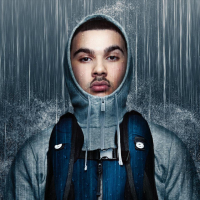
In the endlessly shifting landscape of contemporary music, few figures feel as enigmatic and simultaneously omnipresent as Mechatok. Born Timur Tokdemir and based in London, Mechatok has, over the past decade, shaped the soundscape of a generation without ever fully stepping into the center of the frame. His signature touch — crystalline, melancholic, minimal — has been the secret sauce behind some of the most hypnotic tracks by Yung Lean, Charli XCX, and Oklou. Now, with his first official solo single “Expression on Your Face” featuring Bladee and Ecco2k, Mechatok finally claims his place under the spotlight.
From the backdrops to center stage
Mechatok’s career is a study in subtlety. His production style eschews maximalism in favor of gentle layers, melodic space, and emotional resonance. In a culture obsessed with loud drops and bombastic hooks, he’s made an art form of restraint. His beats feel like wandering through an empty city at dawn — reflective, haunted, and strangely comforting.
The track “Expression on Your Face” captures this essence spot-on. Featuring connectors as Bladee and Ecco2k, it’s a song that sounds like crying on a crowded dance floor — intimate, yet public; soft, yet undeniable. The interplay of airy synths, understated percussion, and whisper-soft vocals embodies what Mechatok has been quietly building toward for years: music that feels deeply human, even when it sounds otherworldly.
A sonic lineage
To understand Mechatok’s impression, one must consider his sonic ancestors. His minimalist approach owes as much to Brian Eno’s ambient experiments as it does to the sleek, emotional techno of producers like Arca or SOPHIE. The melancholy woven into his music recalls the introspective balladry of James Blake, while the crystalline surfaces evoke the hyper-modern sheen of PC Music.
Yet Mechatok’s work is distinct in its emotional texture. Where some minimalists lean into cold abstraction, he imbues each chord and beat with warmth and vulnerability. His production for Yung Lean, particularly on the album Starz, introduced a shimmering softness to Lean’s typically icy aesthetic, marking a turning point in both artists’ sonic narratives.
London as muse
Though Berlin and Stockholm have often been cited as Mechatok’s creative playgrounds, London remains his spiritual home. The city’s long-standing relationship with club culture — from drum and bass to grime to UK garage — echoes through his work, even as he pushes beyond the traditional confines of the dance floor.
London is a city of paradoxes: hyper-connected yet isolating, vibrant yet haunted by its own ghosts. Mechatok’s music embodies this duality, offering soundscapes that feel simultaneously communal and intensely personal. “Expression on Your Face” sounds like an ode to those nights spent wandering across South Bank, the glow of street lamps reflected on the Thames, heart aching with an unnamed longing.
Leaving the club — and returning to self
Mechatok’s decision to step into the solo spotlight reflects a broader trend among producers reclaiming their narratives. Historically, producers have often been relegated to the background, their contributions shrouded by front-facing vocalists. But in recent years, producers like Kaytranada, James Blake, and Arca have broken this mold, revealing the rich inner worlds behind the boards.
For Mechatok, leaving the club is both literal and metaphorical. The club has long been a sanctuary for exploring collective identity, but it can also become a mask. By stepping away from its confines, he embraces a different kind of intimacy — one that doesn’t rely on strobe lights or communal catharsis but instead on quiet self-reflection.
Literary and artistic echoes
The emotional architecture of Mechatok’s music has literary parallels in the works of Haruki Murakami, who often explores themes of urban isolatio`n and surreal tenderness. Like Murakami’s protagonists, Mechatok’s sound drifts through dreamlike spaces, where reality and imagination blur.
Similarly, the atmosphere of his new work resonates with the paintings of Edward Hopper, capturing moments of introspection within public spaces. A lonely figure in a diner; a solitary man at dawn — these are the visual equivalents of the sonic worlds Mechatok builds.
Recent trends: Emotional vulnerability in music
Mechatok’s emergence as a solo artist also aligns with a broader cultural shift toward emotional vulnerability in music. Where previous decades celebrated bravado and excess, today’s listeners crave authenticity and rawness. Artists like Phoebe Bridgers, Frank Ocean, and FKA twigs have paved the way for this movement, offering deeply personal narratives that invite listeners into their inner worlds.
“Expression on Your Face” epitomizes this trend. It doesn’t demand attention through volume but earns it through nuance. It is a song that asks you to lean in, to listen closer, to feel.
Sound advice and playlist curation
To mark his solo debut, Mechatok shared a Sound Advice questionnaire and a playlist that drifts like vapor through a late-night studio haze. Madonna’s “Get Together” and Daft Punk’s “Something About Us” serve as touchstones, highlighting his reverence for dance music’s emotional core. These selections speak to a desire for connection — to lose oneself in rhythm while simultaneously finding oneself.
No sunglasses indoors, he advises. It’s a small, almost comical note, but it encapsulates his ethos: remove the barriers, let the world see your eyes — and perhaps, your soul.
A new archetype of the producer
Mechatok is not simply stepping into the foreground; he is redefining what it means to be a producer-artist in the 2020s. Rather than adopting an alter ego or larger-than-life persona, he offers quiet honesty. Rather than commanding the crowd with bombast, he invites it into a shared whisper.
In a world of hyper-curated images and algorithm-driven bangers, this approach feels revolutionary. It suggests a future where music becomes less about spectacle and more about shared emotional truths.
The expression on all our faces
With “Expression on Your Face,” Mechatok hasn’t merely left the club; he’s invited us all into a softer, more contemplative space. It’s an invitation to embrace sadness, to dance through it, and to recognize the beauty in being seen — really seen.
As he continues to navigate this new chapter, one can only imagine the sonic landscapes he’ll map out next. If his past work taught us how to feel alone together on the dance floor, his solo endeavors promise to teach us how to stand alone and still feel whole.
For anyone who has ever shed a tear to a beat no one else heard, or felt an inexplicable connection to a fleeting synth line, Mechatok’s new chapter is a gift. A reminder that even in our quietest moments, we are never truly alone.
No comments yet.








